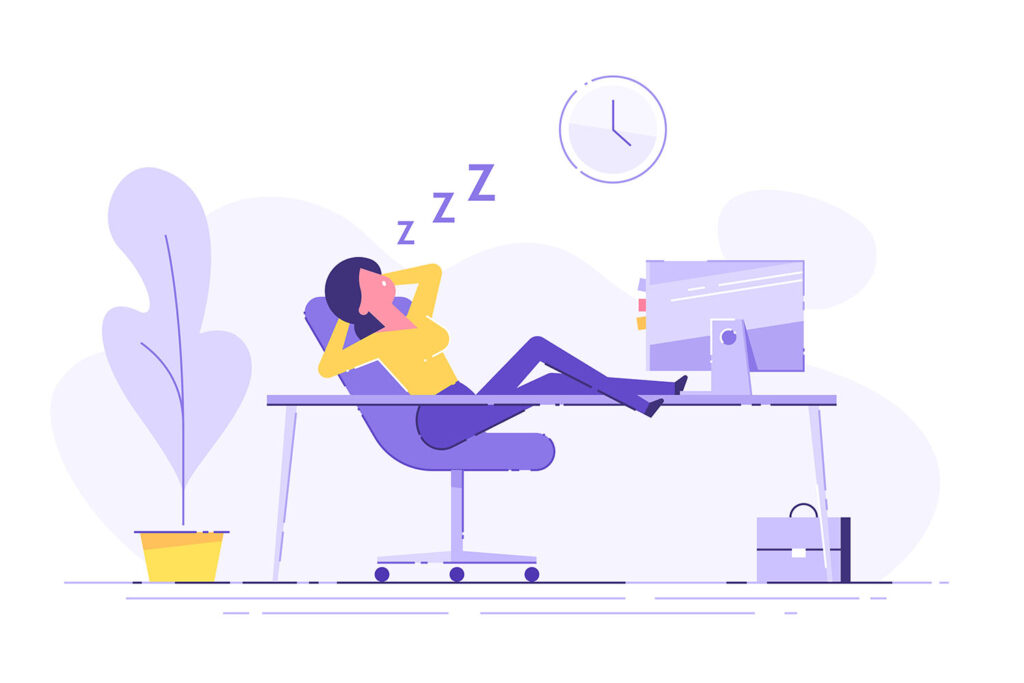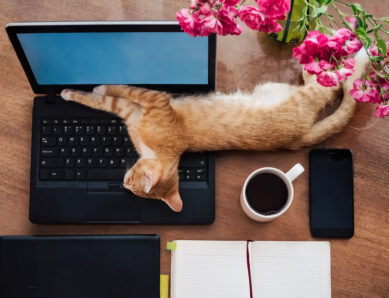It was around 2 p.m. when I knew I was in trouble. I sat at my desk, struggling to keep my eyes open as my laptop glared back at me. Soon, I’d be napping. I was in for an unproductive afternoon.
The urge to take an afternoon snooze has grown stronger in recent times – particularly since I started working from home. And, if I’m being honest, I’ve caved and used my lunch break to take a nap on more than a few occasions.
But I could never shake the grogginess and guilt that hung over me the rest of the day. Catching a few extra winks didn’t exactly feel like a productive use of my time. And was it possible that I felt even more tired than before?
The Science Behind the Afternoon Slump
It turns out that I’m not alone in feeling a little sleepy. In fact, research shows that more than a third of adults in the U.S. don’t get enough sleep and a quarter of Brits report feeling tired “most of the time.” This can severely impact your energy levels throughout the day.
Many of us will be familiar with the afternoon slump. Usually occurring between 1 p.m. and 3 p.m., this drop in our energy levels can be caused by all sorts of factors: from natural dips in our circadian rhythm or a carbohydrate-heavy lunch to more serious issues such as insomnia, anemia or hypothyroidism.
Not only can persistent fatigue be bad for your health, but it can also severely impact your work. Productivity can dip, mistakes can creep in, and it can even affect your memory. In the U.S., poor sleep is believed to cost the economy $411 billion every year.
The Power of Napping
When your eyelids are feeling a little heavy, you might be tempted to reach for the caffeine or simply power through to the end of the day. Instead, research suggests that napping may well be the answer.
Napping is no longer a luxury reserved just for children. Scientists are encouraging working adults to step back from their rigid routines and rest their eyes for just 30 minutes a day. In return, power nappers reported feeling more energized, focused and creative. Long-term napping may even help your ability to learn and prevent brain shrinkage!
But does it actually work? Well, there was only one way to find out: I put the theory to the test and took a power nap every day for a week, and these were the results.

Do Naps Really Work?
Monday
A busy weekend and a late Sunday night added up to a sluggish Monday morning for me. Frankly, I was looking forward to getting some more sleep. Through my research, I’d found that 20 minutes seemed to be the optimal amount of time for a power nap, though I’ll admit I was a little skeptical that it would be enough to tackle my fatigue.
When my afternoon slump bore down on me at 2 p.m., I set the timer on my phone and shut my eyes. Perhaps it was the pressure of trying to make the most of those precious 20 minutes, or maybe it was just my neighbor’s love of loud drum ‘n’ bass, but I certainly didn’t sleep. However, I was pleasantly surprised that I still felt rested.
Tuesday
After the previous day’s noisy distraction, I chose a quieter location for my nap. I was pleased to find that I was able to fall asleep this time around. The alarm ringing in my ear was an unwelcome wake-up call, however, and did leave me feeling a bit grouchy.
Wednesday
Disaster hit on Wednesday. I managed to sleep through my alarm and napped for a whole 45 minutes. I was totally disoriented and paranoid that I could have lost even more of my day, so Wednesday did not turn out as productive or relaxing as I’d hoped.
Thursday
It was a busy day of meetings and deadlines, so it wasn’t until 4 p.m. that I managed to find time to shut my eyes. By this point, however, the afternoon slump had been and gone so I pretty much just relaxed on the sofa for 20 minutes. Not that I was complaining!
Friday
By the end of the week, I felt much more confident. I’d found the best spot in my flat for a midday kip and had gathered a handful of guided meditations to help me doze off. I had mastered the power nap and I was able to tackle my afternoon with enough energy to complete my to-do list – and with time to spare!
What Makes the Perfect Power Nap?
It’s safe to say that I’m now a convert to the power napping movement. But it took a little while to find the right balance, and everyone’s routine will be different. So, if you’re looking to incorporate power naps into your working day, here are the answers to some questions you may be asking yourself.
When Should I Nap?
This will depend on your schedule, but experts suggest timing your nap midway between waking up in the morning and going to bed in the evening. For most people, this will fall around 2 p.m. to 3 p.m., when your circadian rhythm is naturally inclined to dip.
Listen to your body: if you feel your energy waning, this may be its way of telling you that it needs sleep. But be careful about napping too late in the day or you may struggle to get to sleep later.
Where Should I Nap?
It might sound obvious, but a quiet spot is best for an effective nap. High-traffic areas will be too distracting so try to find a comfortable space where you can shut out the noise and focus on your rest. This will likely be easier if you work from home but sleep pods are a great option if you want a place to snooze in the office!
How Do I Nap?
Thoughts of upcoming meetings, deadlines, and growing to-do lists can prevent you from making the most of your power nap. In these instances, I found it helpful to listen to music or guided meditations. Earplugs are also useful if, like me, you struggle with noisy neighbors.
How Long Should I Nap For?
The ideal nap length will vary from person to person, but the prevailing advice is for somewhere between 15 to 30 minutes.
I often found it tempting to ignore the alarm and go back to sleep. But after a short adjustment period, 20 minutes was enough time to fend off the afternoon slump without feeling groggy or sacrificing my entire lunch break.
How to Improve Your Sleep Hygiene
Napping may have many benefits, but experts are clear that this should not be treated as a remedy for “sleep debt” – when you sleep fewer hours than your body needs.
Your ideal amount of sleep will depend on factors such as your metabolic rate and chronotype (your inclination to sleep at a certain time). But most adults need at least seven hours of sleep every night. The more of these hours you miss, the more sleep debt you’ll accumulate.
So, if your fatigue persists, it may be time to reassess your nighttime routine. A healthy diet, exercise, and reduced screen time are all simple and effective ways to get a better night’s sleep. If your symptoms don’t improve, be sure to seek medical advice.
Napping in the Workplace
From siestas to the Japanese practice of inemuri (sleeping at work), it’s clear that some parts of the world have been quicker to incorporate afternoon naps into their schedules than others. But as evidence grows to support the benefits of naps, sleep could well become a more commonplace fixture in our working routines!
Useful Resources:
Getting a Good Night’s Sleep
Rest, Relaxation and Sleep
Why We Sleep: The New Science of Sleep and Dreams
The Science of a Good Night’s Sleep
10 Ways to Get a Better Night’s Sleep
Energizing Yourself
How to Relax After a Hard Day

About the Author
Content Editor Rosie Robinson is a passionate and eclectic learner. She’s relearning Japanese, taking singing lessons, and has just completed a screenwriting course. With a background in illustration, she loves to produce attractive and eye-catching content. Rosie works on a variety of Mind Tools resources and is a key part of our video team: writing scripts, helping to run filming days with presenters and actors, and creating montage videos of her own. She advises others to say yes to any opportunities that arise. “Chances are, you’ll be able to pick up the new skills you need much faster than you thought.”



